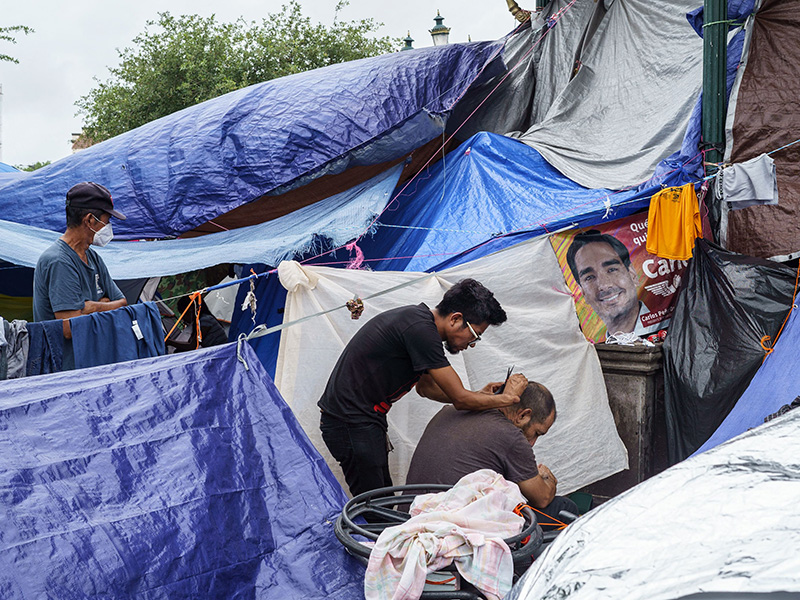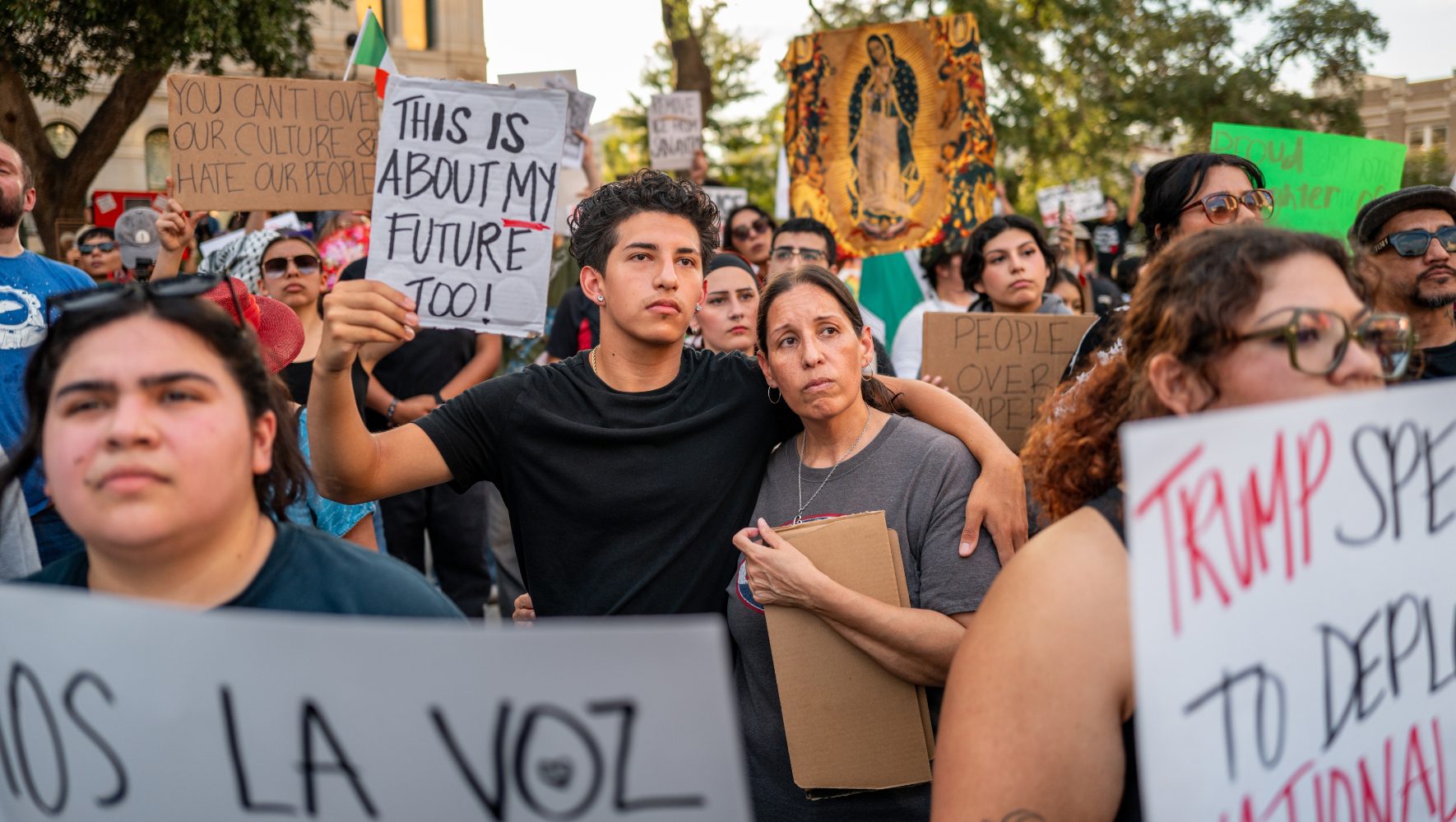The Tragedy of "Remain in Mexico"
By Dan Friedman
Sep 17, 2021

Migrants give each other haircuts in a makeshift camp in the border town of Reynosa, Tamaulipas, Mexico, July 10, 2021
(Paul Ratje/AFP/Getty Images)
What we often overlook about Shakespeare’s Romeo and Juliet is that they were privileged children. The story of the teen offspring of nobility may have ended tragically, but that’s because the Montague and Capulet heirs chose to end it that way. For many people – including the 70,000 people caught by the Supreme Court’s late August “Remain in Mexico” decision — the tragedy is out of their control.
HIAS Mexico client “Romeo” was no spoiled teenager, just someone attacked for his beliefs, trying to do the right thing. He arrived in Mexico in 2019 fleeing political persecution in Cuba, aiming to request asylum in the United States. He wanted to do things by the book, so he signed up on the official list in Matamoros, a city on Mexico’s Gulf coast and, after spending several months in Tamaulipas state, his turn came to enter the U.S.
Here’s where the Remain in Mexico program kicked in — and kicked Romeo out. Prior to the Trump administration’s 2018 creation of the program — more formally known as the Migrant Protection Protocols (MPP) — American law conformed to international treaties. According to those, the country upon whose mercy you had thrown yourself, was obligated to provide temporary asylum if you had a reasonable case, until that case could be heard.
Being granted such temporary protection meant a degree of safety, a guarantee of a court date and an opportunity for HIAS and other humanitarian groups to provide legal representation. The obstacles facing qualified applications are tricky enough for those natively fluent in English, let alone the many, like Romeo, who are not. From January 2019, though, Trump’s MPP program insisted that even those who had the right to a hearing should be given notices to appear in immigration court and sent back to Mexico where they faced what the FBI has called “a “tide of violence” by organized crime syndicates.
That’s what happened to Romeo (not his real name). Within a few hours of presenting his application for asylum, he was given papers for a court appointment and, like many others, returned to Mexico under MPP policy. Returning to Matamoros, he stuck out as a foreigner and was kidnapped. As well as taking his money, the kidnappers held him prisoner for the week when he was supposed to be in court, meaning that, like 14 of every 15 MPP cases, the system failed to grant him the relief of legal entry to the United States.
When President Biden came to office, he immediately halted the MPP program, refusing to add to the existing 70,000 cases cited by the Texas Tribune and others. On June 1, 2021, Homeland Secretary Alejandro Mayorkas disbanded the program with a memo. That led to an artificial surge of cases arriving in Texas and Missouri, from pent up demand caused by the lack of cases being seen since the implementation of MPP in January 2019.
When Romeo heard that people with inactive MPP could be helped to enter the U.S. and reopen their cases, he was excited and thought he might finally be on track to live a normal life. After the trauma of the kidnapping, he had moved away to Monterrey where he fell in love with “Giulietta,” a Honduran woman, who was also fleeing her country looking for some legal way to request asylum at the border. Romeo and Giulietta decided to marry so that they could enter as a family.
In early August, they clicked on the Department of Homeland Security page for people eligible for processing and signed up together. However, a few days later the U.S. Supreme Court sided with Texas and Missouri complaints that the executive orders to scrap MPP had not been properly written or administered. That meant no border entries for people like Romeo for the indefinite future.
Romeo and Giulietta (not her real name) were caught out by the news but thought they could get around it. They travelled north to Acuna on the Rio Grande border, about three hours west of San Antonio. Naively, they believed smugglers who told them that if they entered the U.S. through the desert in that area, they would not be returned to Mexico.
They crossed and surrendered to the authorities. Romeo, the HIAS client, was not returned to Mexico but Giulietta was. She decided to return to Monterrey but, during the trip, she was detained by Mexican migration officials and deported to Honduras. She was unable to ask for help to stop her deportation because her deportation was immediate, and she was not allowed to make calls.
So, while Americans were celebrating Labor Day and Jewish Americans were celebrating Rosh Hashanah, the Jewish New Year, Romeo and Giulietta were suffering their latest traumas. The separation has affected them both psychologically and both are showing symptoms of severe depression. In Honduras, Giulietta constantly cries. She feels tired and hopeless, she does not want to get out of bed. Romeo has trouble sleeping or eating, he is constantly angry and frustrated.
Although our attention has been captured by the humanitarian crisis in Afghanistan, another one of about the same scale is forming on our southen border. Unless we address this potential crisis, America’s logistical failings with regard to displaced Afghans might be seen by the global community as part of a larger ethical failing. “The U.S. will lack any moral leadership… unless we also accept our international obligations,” says Andrew Geibel HIAS’ policy counsel.
It may not seem it, because as per Geibel, the program “is inherently dehumanizing and degrading,” but, despite the stress he has endured, Romeo is ahead of the curve. Unusually for someone who crossed the border after receiving a hearing date, he is in America awaiting his case. Now, with the support of HIAS and, after nearly three years of unnecessary trauma caused by MPP, he stands a good chance of, finally, winning legal entry and bringing his wife over as a legal immigrant too.
But asylum seekers’ ability to wait in the U.S. pending their hearing may soon change. As required by the district court, the administration submitted their first “Progress Report” on September 15, providing necessary but minimal information about how it was restarting MPP “in good faith.” Notably omitted was any mention of how it might end the program, leaving the fate of tens of thousands of people like Romeo hanging in the balance.
Geibel is clear that “what would help strengthen America’s moral standing and prevent asylum applicants from waiting in danger south of the border is a revamped, improved and comprehensive memo from Mayorkas.” The court held that the Biden administration needed to consider additional factors before they end the program because of the Administrative Procedures Act that imposes procedures on executive actions. To satisfy those requirements requires work, diligence, and the impartiality of the court, but if the administration can issue a new memo taking those factors into account, it will be closer to ending the program a second, and perhaps final, time.
There may be some in the administration who consider the deterrent impact of MPP a political benefit. And, because there’s some precedent, because it is easier, and because the court is likely to approve it, the administration may propose something that they will claim is a more compassionate version of MPP.
But others undertand the tragedy of maintaining any version of the Remain in Mexico program. "It would mean keeping asylum applicants in dangerous parts of a foreign country, which is not only illegal, but also inhumane and cruel,” said Sue Kenney-Pfalzer, HIAS’ director of the Border & Asylum Network.



